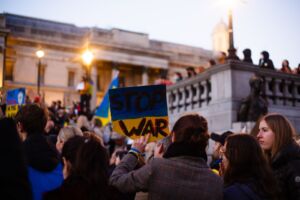What CU Boulder has to say about America's involvement in Ukraine
The Ukraine invasion is causing chaos as uncertainties linger about what could happen.
By: Angelique Courtney

On Feb. 24 Ukraine was invaded by Russia. The war between the two countries started when Russia occupied the Crimean Peninsula in February 2014, but there has been tension between the two countries since at least the 1930s.
Vladimir Putin, the president of Russia, said his goal for the current invasion was to “demilitarize and de-Nazify Ukraine.” The New York Times called Putin’s rhetoric “puzzling,” particularly given that Ukrainian President Volodymyr Zelensky is Jewish and some of his family members died in the Holocaust.
The United States, which has refrained from military involvement, is a member of NATO, while Ukraine is a partner nation. U.S. leaders have voiced their support for Ukraine’s democracy. Although the U.S. may not be directly involved in the combat, there is still room for conversation about how the nation can help Ukraine.
President Joe Biden will be providing $800 million in security funding for Ukraine, which will help pay for body armor, helicopters, weapons and other necessary items.
NATO’s members are among the countries that support Ukraine. The organization currently consists of 30 nations, including the U.S., the United Kingdom, Canada, Germany and France.
Although Ukraine is not a member of NATO, they are a partner nation. NATO has an open door policy where countries have opportunities to become members. Ukraine did plan on finishing the Membership Action Plan that all the other countries have had to complete. In March, Zelensky publicly stated that Ukraine would not be joining NATO.
NATO is a defense system created to provide security and freedom for members through political help. Currently, NATO is helping Ukraine by delivering non-lethal military and humanitarian aid to the country while it remains at war.
Experts have differing ideas about exactly what will happen next. Here at the University of Colorado Boulder, one professor with knowledge of geopolitics has commented on how Ukraine’s and Russia’s relationships with other countries could affect the outcome of this war.
John O’Loughlin is a professor who focuses his studies on geography, politics, the Soviet Union, and nationalism. In an interview with The Bold, O’Loughlin talked about the extent of the situation happening between Russia and Ukraine.
On the topic of NATO’s involvement in the war, O’Loughlin stated, “The question is not about how NATO will be involved, because they’re already extremely involved. The question revolves around the extent of countries being in Ukraine.”
O’Loughlin also discussed the escalated state of the war and how many people are expected to flee Ukraine and become refugees in Europe. Already, over 10 million people have fled the country.
“Many people have already left, and I expected there to be around six to seven million people leaving,” said O’Loughlin in late March. “But that seems like it would be on the shorter end now with the number of people who have already left.”
The number of estimated refugees that Professor O’Loughlin provided have continued to grow as the conflict escalates.
Mass displacement of citizens during conflicts can cause neighboring countries to close their borders down to refugees—as has happened in the past with other wars.
“The countries that Ukrainians are fleeing to are poorer countries. They don’t have what they need to support these people,” O’Loughlin said.

